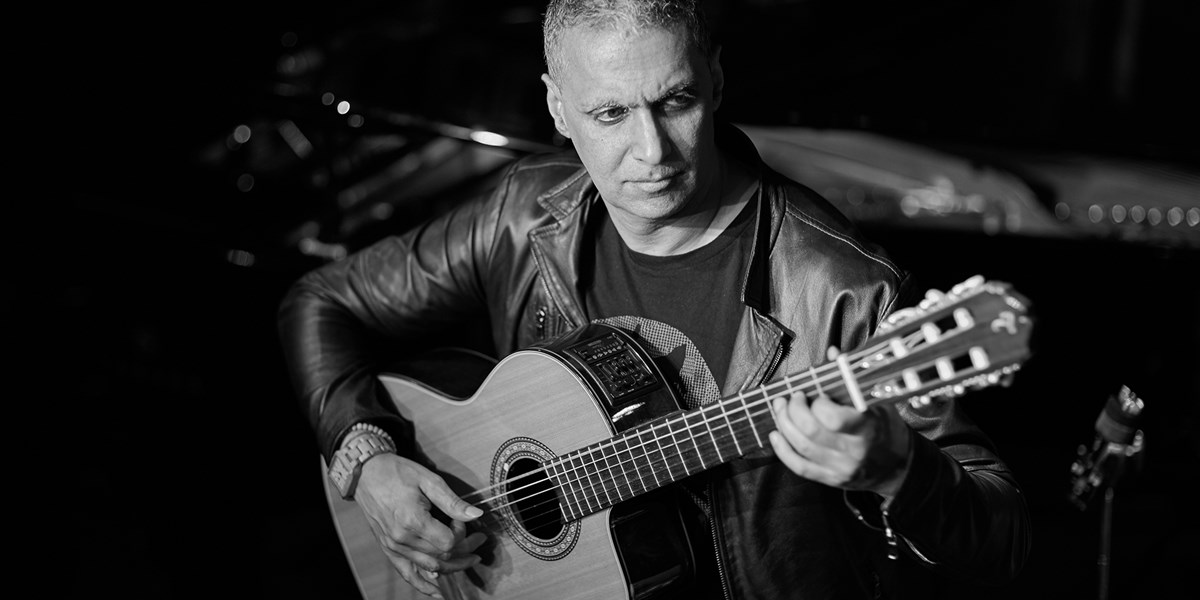Wednesday, October 2, 2019
Nitin Sawhney interview: “Beyond Skin was about the paradox of how we perceive nationality and religion”
The composer, producer and musical polymath Nitin Sawhney is revisiting his acclaimed Beyond Skin album 20 years after its release. He talks politics and music with Nigel Williamson

Nitin Sawhney has never been a musician who has looked back, always tending to focus on the next project rather than the last one. But now he’s in his mid-50s, 2019 marks several landmarks that offer a convenient vantage point from which to survey and evaluate his career – a quarter of a century since his debut solo album Spirit Dance and 20 years since 1999’s Beyond Skin, his defining breakthrough album that helped to force the British Asian Underground into the mainstream.
In September, Sawhney for the first time performed Beyond Skin in its entirety at London’s Royal Albert Hall, not merely because of the convenience of an anniversary on the calendar but because the issues of identity, nationality, race and religion that the album addressed seem more relevant today than ever.
“It was an important album for me that not only encapsulated my identity but was about the paradox and hypocrisy of how we perceive nationality and religion,” he says. “Tracks like ‘The Immigrant’ are just as salient now given the tsunami of propaganda in the mainstream media, gas-lighting us into believing immigration is a bad thing.”
He’s clearly not alone in thinking Beyond Skin’s message resonates as strongly today as it did 20 years ago: tickets for the Royal Albert Hall concert sold out in a single day.
In fact, Beyond Skin may be more starkly relevant to our current times than it was on its release in 1999, when the world was in the grip of a brief moment of pre-millennial optimism in which it seemed we were becoming a more tolerant and humane society. That illusion was swiftly shattered by the events of 9/11 and it would be hard not to conclude that we have since taken a massive backwards step.
“Beyond Skin came at a time when it felt like there was a sense of transition and a change for the better,” Sawhney reasons. “It seemed society was embracing multiculturalism in an exciting and progressive way and part of me felt ‘look how far we have come.’ But I listen to the album now and it feels like ‘look how far we have regressed.’”
The day before we meet in his studio, hidden away in a quiet cul-de-sac in the back streets of Brixton, President Trump had been on a Twitter rampage, inciting racial hatred by telling four strong and brave American women of colour to ‘go back’ to the countries they came from – even though three of them were born in the US and the fourth had been a US citizen for 30 years.
In response, Sawhney had tweeted ‘Whatever happened to evolution?’ With his customary thoughtful mien, he muses that wouldn’t be a bad title for his next album. But his soft voice is deceptive and beneath his benign and cerebral demeanour, he cannot contain his anger, denouncing Trump and his supporters as “brain dead” and Boris Johnson as a “misogynist and racist.” He had more to say about our political leaders, none of it really fit to print in a family magazine.
“I’ve always had one basic way of thinking – that every human being is of equal value. That seems so obvious as a default position,” he says. “But the world has become so aggressively politicised in a prejudicial way – whether through Trump’s America or Brexit or whatever else – that people somehow think it is now legitimate to say every human being is not of equal value.”
“What’s going on right now is disgusting. We’ve normalised the unacceptable in terms of hate-mongering language. How has this happened? I don’t see how anyone can sit on the fence in the light of this stuff.”
Sawhney certainly hasn’t sat on the fence and his anger led him to compose his first oratorio (a narrative-based piece for orchestra and voices), Brexit: A Rational Anthem for a National Tantrum, which premiered at the Barbican in February this year and featured a reworking of ‘Bohemian Rhapsody’ as a commentary on our fractured society and Lord of the Rings star Andy Serkis dressed as Theresa May.
“I enjoyed doing that,” he says. “But I can’t see how we’ve got to this low point. It feels like we’re slipping backwards.”
Does he feel artists have a duty to speak out against the madness in times of darkness? “It’s not so much a duty, but I feel it’s difficult to ignore it,” he replies. “My music has a symbiotic relationship with what is going on in the world around us. I don’t intend to put out didactic messages. But I engage with what’s happening in society. We can’t pretend we’re playing music in a vacuum. I find that bizarre.”
The opening lines of his Brexit oratorio declares: ‘It’s only random chance, That we weren’t born in Spain or France, Or China or a plane or ocean liner, Or a field in Asia Minor.’
“Of course you can be proud of your culture,” he explains. “But nationality and religion are something you are born into by chance. I’ve always found it amazing that we allow ourselves to be defined by chance rather than by our own exploration of the universe.”
Born in Rochester, Kent, in 1964 to Punjabi immigrant parents, Sawhney is rightly proud of his own Indian cultural heritage. “It’s important to me in different ways,” he says. “I often had to suppress it growing up in order not to get my head kicked in. But learning about the beauty of Indian classical music was a fantastic journey.”
When he was growing up and first learning the guitar, he tried to play along to his father’s Ravi Shankar albums. “I remember my dad playing me this sitar record and asking him whether he really played that fast or was it some kind of trick,” he recalls. “When my dad told me that he actually played at that speed I was amazed.”
If it was a defining moment in Sawhney’s musical education, he never could have imagined that 40 years later he would be at Shankar’s bedside when he died. “There were just three or four of us in the room and I was holding his arm as he passed away. I remember thinking ‘this is the arm that inspired me to play music when I was seven years old.’ To realise that arm no longer had life in it was an overwhelming experience.”
Having produced and written much of Anoushka Shankar’s 2013 Grammy-nominated album, Traces of You, Sawhney is now godfather to Ravi Shankar’s grandson, Zubin.
Yet while Hindustani music has always had a central place in his work, it is only one of many strands. “I’m not an Indian classical musician, I’m a composer,” he says. “But I have an understanding of the established rules of raag and tal that allows me to create something that works harmonically with Indian music.
“Later I became a jazz musician and got into lots of different styles. But for me all of them are equally valuable and interesting in terms of building a musical palette which you can draw from and create pictures in sound.”
The eclecticism was reinforced in the music Sawhney revealed he could not live without when he was the castaway on BBC Radio 4’s Desert Island Discs earlier this year. For those who missed his appearance, his eight choices speak volumes about the dazzlingly diverse influences at play in his own work: Paco de Lucía, Massive Attack’s remix of Nusrat Fateh Ali Khan’s ‘Mustt Mustt,’ Joni Mitchell, John McLaughlin and Shakti, Ennio Morricone, Debussy’s Prélude à l’Après-Midi d’un Faune, Oumou Sangaré and Brazil’s Seu Jorge.
World music doesn’t come any more global, although Sawhney has always been notoriously hostile to the term. Asked if his attitude has softened, he shakes his head. “I’ve probably hardened against it!,” he says with a good-natured laugh. He points out that when he hosted a BBC Radio 2 series showcasing what the rest of us might call world music, he assiduously avoided the term and titled the show Nitin Sawhney Spins the Globe.
His objection to the term is principled enough. “I appreciate the good intentions behind it, but if it is about equity, why isn’t all music called world music?”
Given that his own all-encompassing oeuvre spans everything from Western classical to hip-hop and from jazz to flamenco via Indian and Brazilian music and a hundred equally eclectic influences drawn from every corner of our planet – isn’t he the ultimate ‘world musician’? But he’s having none of it.
“I know it’s well-meaning but as a term world music is a stigma and is used as a kind of cultural apartheid,” he insists. “I know that’s not the intention but the semantics can become abused.”
If we’ve ostensibly spent much of our interview looking back, Sawhney points out that “in the context of where we are now, Beyond Skin is also looking forward, which is pretty frightening.” However, when asked what’s next on his agenda, news about half a dozen new Sawhney projects invariably gushes forth.
There’s an imminent tour of Australia, on which he’s looking to find ways of involving the country’s indigenous peoples. There are several film and TV soundtracks on the go, including the BBC’s adaptation of Vikram Seth’s novel
A Suitable Boy. After the success of his score for 2018’s smash hit Hollywood movie Mowgli, based on Kipling’s Jungle Book stories, directors and producers are beating a path to his door and he can afford to take his pick of only those projects which he finds most stimulating.
Having just signed a record deal with Sony Music Masterworks – the first time in 25 years Sawhney has been on a major label – he’s planning the belated follow-up to 2015’s Dystopian Dream, which he promises will be as “different and challenging” as possible.
There’s a sit-com in development, which picks up where he left off in the 1990s when he appeared in the famous ‘Going for an English’ sketch in BBC2’s Goodness Gracious Me TV show, and it comes as little surprise to learn that there’s a book on the go, too. “It’s looking at music from different perspectives – anthropological, theological, scientific, cosmological… I want it to have an academic rigour, but with anecdotes and personal experiences in there, too, so in a way it will be autobiographical.”
It’s this combination of unquenchable creativity and insatiable curiosity that has led to such soubriquets as ‘polymath’ and ‘renaissance man’ being routinely attached to the Sawhney name, although refreshingly he sees it in less grandiose terms.
“Music has been a passport to possibility,” he says modestly. “It takes me into so many different areas of thinking and I’m very lucky because people seem prepared to accept me doing just about anything.”
Indeed. So what is still outstanding on his bucket list – a Nitin Sawhney opera perhaps? It was said half-jokingly but one should have known better. “It’s always good to go into a new art form and see what that brings up,” he says. “I can’t talk about it yet. But there have been conversations...”
Nitin Sawhney will perform at From the Source Festival at Warwick Arts Centre in Coventry on November 8, see the Gig Guide or nitinsawhney.com for details
This article originally appeared in Songlines #151. Never miss an issue – subscribe today!

